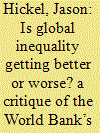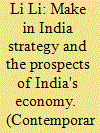| Srl | Item |
| 1 |
ID:
076897


|
|
|
|
|
| Publication |
2007.
|
| Summary/Abstract |
China's economy in 2006 continued to register high growth of 10.5 to 10.7 percent with low inflation (CPI at 1.3 percent), dissipating fears of a hard landing. Since its accession to the WTO, China has become a significant global economic player, and is the favorite destination for many regional and global production networks. China is now a truly economic power (jingji daguo). China s economic leadership is also increasingly confident of its ability to manage China s domestic economic growth and its growing relations with the outside world. Although China s growth is expected to slow down in 2007 to approximately 9.5 percent, the national mood now is one of "more balanced" growth rather than "fast growth". Therefore, the building of a "harmonious society" is to be emphasized in China, while letting economic growth solve the burning social and environmental issues. In 2007, the government will also need to deal with various internal and external macroeconomic imbalances. The renminbi will be under even stronger pressure to revalue, given China s record trade surplus of US$160bn and foreign reserves of US$1tn
|
|
|
|
|
|
|
|
|
|
|
|
|
|
|
|
| 2 |
ID:
134406


|
|
|
|
|
| Summary/Abstract |
An important political consequence of the crisis of capital in the 1970s has been an increasing intensification of informal imperialism within Africa. This paper argues that the advanced capitalist countries again confronted the endemic problem of overcapacity alongside a decline in the rate of profit and that the major neoliberal reforms foisted upon the African continent were part of the spatio-temporal fix that followed. The quotidian management of many African states was not an intended consequence of structural adjustment, but the subsequent perturbations that beset many developing countries after following such policies has led to such a degree of institutional instability that a new form of imperial governance has come into being. Juridical sovereignty has been maintained, but political sovereignty has been severely compromised through the emergence of this neo-imperial governance. Today an array of external actors is embedded in the sinews of these states, setting the general parameters of state policy to such an extent that one can no longer speak of these countries as possessing de facto independence. The rise of these so-called ‘governance states’ and the new emphasis on ‘governance with government’ constitute a new non-territorial, political form of imperialism.
|
|
|
|
|
|
|
|
|
|
|
|
|
|
|
|
| 3 |
ID:
154787


|
|
|
|
|
| Summary/Abstract |
The dominant narrative of global income inequality is one of convergence. Recent high-profile publications by Branko Milanovic and the World Bank claim that the global Gini coefficient has declined since 1988, and that inter-country inequality has declined since 1960. But the convergence narrative relies on a misleading presentation of the data. It obscures the fact that convergence is driven mostly by China; it fails to acknowledge rising absolute inequality; and it ignores divergence between geopolitical regions. This paper suggests alternative measures that bring geopolitics back in by looking at the gap between the core and periphery of the world system. From this perspective, global inequality has tripled since 1960.
|
|
|
|
|
|
|
|
|
|
|
|
|
|
|
|
| 4 |
ID:
151178


|
|
|